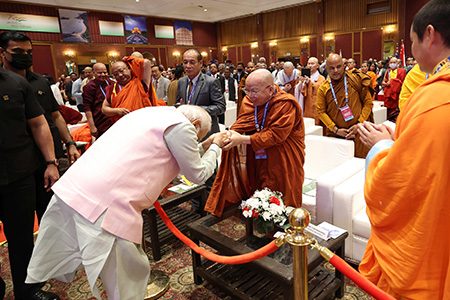“In the Buddhist tradition, the explanation of the mind is very detailed. Also, we find the same in some ancient Indian traditions. Therefore now, today, modern science is investigating deeper and deeper in this area. For instance, medical science is beginning to carry out research on emotions, since they are very important in relation to our health. A healthy body is related to emotions. So it is especially important for neurologists investigating how the brain works to look more at emotions. In other academic fields as well, there is also a big interest in the mind and emotions. Therefore, information about the mind and emotions from Buddhism and from ancient Indian religions is very useful for their research” —HH The 14th Dalai Lama of Tibet on Establishing Harmony within Religious Diversity
The first “Global Buddhist Summit” (GBS) held in New Delhi was a historic occasion for humanity. The Ministry of Culture, under the aegis of the International Buddhist Confederation (IBC), brought together more than 500 delegates, of which around 180 were from overseas, representing 31 countries. The theme, “Responses to Contemporary Challenges: Philosophy to Praxis” itself, was intriguing and challenging enough. Though China, even after the organisers extended the invitation, tried to create a stir by raising negative voices before the summit, the overwhelming participation by the Buddhist organisations of the world gave a befitting reply to such an un-Buddhist move. Some even tried to interpret the initiative merely as a part of Bharat’s soft power diplomacy, again a non-Buddhist paradigm to understand the significance of the congregation. This summit was significant at this juncture for three reasons.
Firstly, the Buddhist schools spread across the continents have their reverence for the land of Buddha, which is Bharat. There could not have been a better place for all of them to come together and reflect on the teachings of Buddha. From Korea, Mongolia, Thailand and Myanmar to Denmark and the US, Buddhist scholars and practitioners assembled under one roof to discuss global challenges and possible solutions to them through the prism of Buddha’s Dhamma. Such a meeting of minds and ideas is a rare commodity in the present world.
As Prime Minister Modi pointed out in his inaugural address – “the current time is the most challenging time of this century”. The ongoing war in Europe, economic instability, the ever-growing environmental crisis and the inability of the international institutions to respond to the glaring situation are the issues at the centre of this crisis. Health and wellness are growing concerns for individuals, and competition for patents and profits cannot provide an answer to the same. Especially when large parts of the world are grappling with the threat of religious fanaticism and terrorism, Buddha’s message of peace and acceptance to overcome misery is all the more critical. The lessons of Karmayoga by Shakyamuni can be a guiding path for dialogue, and finding solutions to all types of challenges was the second important message delivered by the summit.
The amalgamation of academic and Sangha verticals for deliberation on preserving knowledge tradition for humanity was the third crucial dimension of the summit. Spiritual practices are not exclusive of worldly knowledge. Knowledge without morals and wisdom has no value. There have been attempts to misrepresent and misappropriate Buddha and his teachings with the Marxist prism. Western scientificism based on compartmentalisation and fragmentation of knowledge has created delusions about human existence and happiness. The artificial part of technology is overpowering the human aspects of life. Hence, preserving traditions like Nalanda and reconnecting with the genuine Buddhist tradition was essential to realise the universal oneness and inter-civilisational linkages.
Despite all pulls and pressure, the presence of His Holiness, the 14th Dalai Lama of Tibet and his message of courage and compassion was icing on the cake. The “Global Buddhist Summit” called for a paradigm shift in human attitude towards nature and resolved to meet annually through the New Delhi Declaration. Instead of analysing the significance of this historic summit from the prism of ‘national interest’ and global power dynamics, it should be seen as a new beginning of dialogue for sustainable solutions.




















Comments